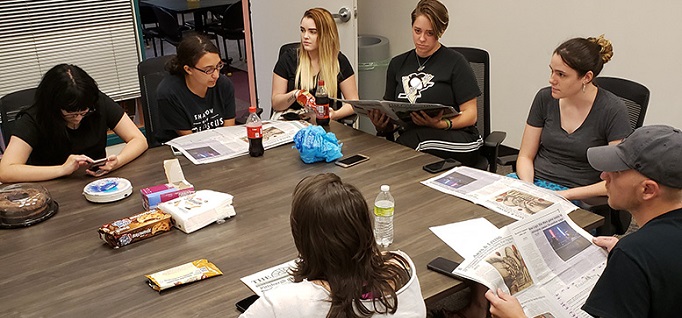Student journalists keep working through the crisis
By Tabitha Whissemore
April 29, 2020
The coronavirus pandemic may have shut down their newsrooms, but student journalists are still on the job.
Ben Levitt is a senior reporter for the College VOICE, the student newspaper of Mercer County Community College (MCCC). He’s been covering COVID-related actions taken by the New Jersey college prior to the statewide closure of all colleges and schools.
He considers the role of journalists more important than ever.
“All this information is going around that nobody knows if it’s true or not. There have to be people who are on top of it,” he says.
And he’s not alone – his colleagues at the VOICE, as well as other community college newspapers across the country, have shown a commitment to delivering news even without an official newsroom to work in.
“There is a true commitment to let the students know what is going on,” says Levitt, who is majoring in advanced manufacturing technology. “(The pandemic) makes it more difficult for us to do our jobs, but it’s more rewarding when we do.”
The VOICE typically publishes in print format once a month during the school year, but also publishes breaking news on the publication’s website. As the pandemic continues, the website is the primary vehicle to promote MCCC news to the college’s students.
Logistical challenges
Though VOICE staff members are trying to maintain their normal publishing schedule, Levitt admits it’s been difficult.
“When we’re on campus, we’re able to stay focused. We’re being reminded we have a job to do,” he says. “When you’re sitting at home, it’s much more difficult to do that. There are more distractions.”
Staff meet virtually via Zoom every week, and collaborate through other virtual means, including Google Drive and WhatsApp.
The student reporters are writing articles ranging from reviews of at-home meal kits, to profiles of health professionals, to the experience of graduating without a graduation ceremony. Levitt is focusing on providing updates about online teaching.
“Everyone on the staff is tired, but tired has never stopped them,” said MCCC journalism and English professor Holly Johnson, who serves as VOICE co-advisor. “One staffer was just laid off from three different jobs that he was working – on top of taking a full load of classes – so he could pay his bills. Another is picking up extra shifts at a restaurant that is suddenly doing take-out only. But I haven’t heard anyone complain or say writing the paper’s too hard.”
The commitment to publishing quality content has earned VOICE staff 23 awards recently, including three from the Society of Professional Journalists. Three other awards, including Best Two-Year Newspaper, came from the College Media Association, with the other awards coming from the New Jersey Collegiate Press Association, including General Excellence and Best Website.
Finding a new groove
The Wild Cat News at Community College of Allegheny County (CCAC) also just won several awards from the Pennsylvania NewsMedia Association. But instead of celebrating at a big ceremony, the student journalists are working hard to keep their newspaper going during COVID-19.
The Wild Cat News staff was starting to wrap up the latest issue of the newspaper when word came that CCAC’s campuses would close. The students who run the paper, which publishes monthly, could have called it quits – they all are volunteers, not receiving credit or compensation for their work. They even raise the money to keep the newspaper going by selling advertising.
But they insisted on continuing their work. With their on-campus newspaper office closed, they moved to group texts and Zoom meetings. And instead of printing the April issue, they moved it online.
“It was a reset moment for us,” says Rebekah Waldron, editor-in-chief and CCAC senior. “We had gotten into a groove and we had this whole set up in the office. Everything was ready and raring to go.”
They had to not only make logistical changes, but also changes to stories and artwork, as well as communicate with advertisers who had paid to be in the print edition of Wild Cat News.
“We were covering events that were no longer happening. We had a couple of days to completely re-plan everything,” says Rob Velella, CCAC student development specialist and the newspaper advisor.
With some scrambling, they were able to get the April issue online on schedule.
Now they’ve found a new groove and the Wild Cat News staff is working hard on the May issue.
“They’re holding on to whatever normalcy they can. And that means constantly being under deadline and looking for sources,” Velella says.
As a leader on the paper, this experience has taught Waldron the importance of flexibility.
“People have had a wrench thrown in their lives. They’ve got worries about class and graduation and family,” she sayd. “It’s not always about a deadline.”
She considers the Wild Cat News staff “a little family.”
“That’s a real incentive to keep working together. We know there’s a handful of us moving on at the end of the semester,” she says. “A lot of us are really motivated to keep going.”
And motivated to report the facts to their campus community.
“We’re doing our best to provide some truth to what’s going on out there,” Waldron says.
There’s more to the story! Read the full article in CC Daily.


